AFACT AHEDA - Attorney-General's Department
AFACT AHEDA - Attorney-General's Department
AFACT AHEDA - Attorney-General's Department
Create successful ePaper yourself
Turn your PDF publications into a flip-book with our unique Google optimized e-Paper software.
____________________________________________________________________________________________<br />
BY EMAIL: copyright@ag.gov.au<br />
8 October 2012<br />
Government Copyright and Reviews<br />
Business Law Branch<br />
Australian Government <strong>Attorney</strong>-<strong>General's</strong> <strong>Department</strong><br />
3-5 National Circuit | Barton ACT 2600<br />
REVIEW OF TECHNOLOGICAL PROTECTION MEASURE EXCEPTIONS UNDER THE COPYRIGHT ACT<br />
1968 SUBMISSION BY <strong>AFACT</strong> AND <strong>AHEDA</strong><br />
The Australian Federation Against Copyright Theft (<strong>AFACT</strong>) and Australian Home Entertainment Distributors<br />
Association (<strong>AHEDA</strong>) provide this submission in response to specific proposals for reform filed by interested<br />
parties in response to the <strong>Attorney</strong> General’s Review of Technological Protection Measure Exceptions under<br />
the Copyright Act 1968 (Cth) (the Review).<br />
Australian Federation Against Copyright Theft<br />
<strong>AFACT</strong> was established in 2004 to protect the film and television industry, retailers and movie fans from the<br />
adverse impact of copyright theft in Australia. <strong>AFACT</strong> works closely with industry, government and law<br />
enforcement authorities to achieve its aims.<br />
<strong>AFACT</strong> acts on behalf of the 50,000 Australians directly impacted by copyright or intellectual property (IP)<br />
theft including independent cinemas, video rental stores and film and television producers across the country.<br />
<strong>AFACT</strong> members include: Village Roadshow Limited; Motion Picture Association; Walt Disney Studios Motion<br />
Pictures Australia; Paramount Pictures Australia; Sony Pictures Releasing International Corporation;<br />
Twentieth Century Fox International; Universal International Films, Inc.; and Warner Bros. Pictures<br />
International, a division of Warner Bros. Pictures Inc.<br />
Australian Home Entertainment Distributors Association<br />
The <strong>AHEDA</strong> represents the $1.3 billion Australian film and TV home entertainment industry covering both<br />
packaged goods (DVD and Blu-ray Discs) and digital content. <strong>AHEDA</strong> speaks and acts on behalf of its<br />
members on issues that affect the industry as a whole such as: intellectual property theft and enforcement;<br />
classification; media access; technology challenges; copyright; and media convergence. <strong>AHEDA</strong> currently has<br />
_____________________________________________________________________________________<br />
Australian Federation Against Copyright Theft Ltd. ABN: 56 106 585 924 ACN: 106 585 924
12 members including all the major Hollywood film distribution companies through to wholly-owned Australian<br />
companies such as Roadshow Entertainment, Madman Entertainment, Hopscotch Entertainment, Fremantle<br />
Media Australia and Anchor Bay Home Entertainment.<br />
The Australian Federation Against Copyright Theft (<strong>AFACT</strong>) and Australian Home Entertainment Distributors<br />
Association (<strong>AHEDA</strong>) provide this submission in response to specific proposals for reform filed by interested<br />
parties in response to the <strong>Attorney</strong> General’s Review of Technological Protection Measure Exceptions under<br />
the Copyright Act 1968 (Cth) (the Review).<br />
General comments<br />
As outlined in the submission lodged by <strong>AFACT</strong> and <strong>AHEDA</strong> on 15 August 2012, the current Technological<br />
Protection Measure (TPM) regime in Australia is fair, workable and strikes an appropriate balance between<br />
interests of those legitimately seeking access to copyright material and the interests of those whose<br />
businesses and livelihoods depend on the protection of copyright material against unauthorised activity.<br />
If the TPM regime is to be amended to incorporate expanded exceptions to the application of the TPMs, then<br />
a demonstrable and evidence-based need for such exceptions must be established. Such an evidence-based<br />
approach has been endorsed by the <strong>Attorney</strong>-General’s department 1 and should be adopted here. The<br />
Review called for submissions in relation to the review of specific limited existing exceptions, and the potential<br />
to create additional exceptions under s 249(4) of the Copyright Act 1968 (Cth) (the Act). This section provides<br />
a number of conditions in order for the Minister to make a recommendation to the Governor-General for an<br />
additional exception to the prohibition against circumventing access control technological protection<br />
measures. These conditions include that:<br />
<br />
<br />
<br />
the act in question is non-infringing;<br />
it relates to a particular class of works or other subject-matter; and<br />
the adverse impact on the ability to carry out the act has been credibly<br />
demonstrated.<br />
A further condition includes that a proposed exception would not impair the adequacy of the protection of<br />
access control technological protection measures and the effectiveness of the remedies for their<br />
circumvention in the Copyright Act.<br />
The majority of the submissions lodged in answer to the Review propose the introduction of new exceptions to<br />
the prohibition against circumvention of TPMs and ignore one or more of these prescribed conditions and<br />
either a) are unable to prove that the conduct that would be enabled by the recommended circumvention /<br />
exemption is clearly non-infringing b) fail to limit their requests to particular classes of works or c) do not<br />
provide any credible demonstration of actual or likely adverse impact. Such submissions therefore do not<br />
meet the standards for review (and thus further consideration) set forth by the <strong>Department</strong>.<br />
1 http://www.ag.gov.au/Aboutthedepartment/Speeches/2012/Pages/Evidence-based-Indigenous-Justice-Policy.aspx.<br />
_____________________________________________________________________________________<br />
Australian Federation Against Copyright Theft Ltd. ABN: 56 106 585 924 ACN: 106 585 924
<strong>AFACT</strong> and <strong>AHEDA</strong>’s main criticism of the submissions proposing additional exceptions is that the parties<br />
seeking to expand the exceptions to the TPM regime fail to establish any evidence-based or specific need for<br />
additional exceptions. Further, in some instances, the submissions call for the blanket removal of TPM rights<br />
(again without any reference to evidence or the specific need for such removal). The TPM regime implements<br />
Australia’s obligations as a signatory to the WIPO Copyright Treaty of 1996. Article 11 requires contracting<br />
parties to provide “adequate legal protection and effective legal remedies against the circumvention of<br />
effective technological measures.” The removal of rights would place Australia in breach of its international<br />
obligations.<br />
In particular, a number of the submissions seek exceptions to the TPM regime for the doing of acts in relation<br />
to copyright works which are permitted by the Act (by way of exception or statutory licence). These<br />
submissions proceed on the basis that if an act is permitted (for example, by way of the fair dealing<br />
exception), then circumvention of TPMs should be permitted in relation to that act. This is simply not the case.<br />
The presence of TPMs does not prohibit entities from using works and subject matter in the manner permitted<br />
by the Act (especially when alternatives exist that allow the desired use without undermining the security of<br />
the content through circumvention), and the limitations that TPMs impose on use are critical to the protection<br />
of the works and subject matter. This is particularly the case in relation to the circumvention of TPMs to create<br />
digital copies of works, which would lead to the proliferation of unauthorised digital copies of the works. Once<br />
a work or subject matter is available digitally in a format unprotected by TPMs, it has the potential to be the<br />
source of large-scale infringement on the internet. In <strong>AFACT</strong> and <strong>AHEDA</strong>’s view, this would be an<br />
unacceptable outcome in a regime which is designed to assist copyright owners in protecting their investment<br />
in the digital world.<br />
Additionally, <strong>AFACT</strong> and <strong>AHEDA</strong> note that the Act as currently framed provides a balance between<br />
exceptions to copyright infringement and protection of copyright material. The exceptions and statutory<br />
licences which are the basis for the proposals in this Review have largely been in place since 2006, the last<br />
time the TPM regime was considered. The Explanatory Memorandum to the Copyright Amendment Bill 2006<br />
states that:<br />
… the present system of exceptions and statutory licences that apply to specific uses of copyright<br />
material…has been maintained for many years because it gives copyright owners and copyright users<br />
reasonable certainty as to the scope of acts that do not infringe copyright. 2<br />
The balanced nature of the current scheme is emphasised by the ongoing development of sophisticated<br />
markets for online digital content delivery 3 (for example through businesses such as iTunes), which have<br />
developed within the existing Act and with the current TPM protection regime in place. This is clear evidence<br />
that the existing regime is not only appropriate, but has enabled the development of the very digital economy<br />
2 Explanatory Memorandum to the Copyright Amendment Bill 2006 at page 7.<br />
3 http://www.afact.org.au/index.php/core/internet/where_can_i_get_movies_tv_shows_legally.<br />
_____________________________________________________________________________________<br />
Australian Federation Against Copyright Theft Ltd. ABN: 56 106 585 924 ACN: 106 585 924
that the government wishes to promote. Conversely, there is no evidence that the current TPM regime is<br />
restricting existing online content delivery models or that it is inappropriately restricting consumers from<br />
enjoying the content within reasonable licensing conditions.<br />
<strong>AFACT</strong> and <strong>AHEDA</strong>’s specific responses to some of the individual proposed exceptions are set out below. As<br />
a preliminary point, the <strong>Department</strong> should be wary of accepting submissions from organisations such as the<br />
Pirate Party Australia, an organisation (not a registered political party) with a primary argument to<br />
“decriminalise non-commercial copyright infringement”, 4<br />
where non-commercial copyright infringement<br />
includes conduct of an owner/operator of a website that makes unauthorised copyright material available<br />
where the primary purpose of the website is not to earn money (even where some income is accrued from the<br />
site). 5<br />
An entity that professes no respect for the rule of law is hardly one on which the government could or<br />
should rely in determining policy regarding whether to expand the scope of the TPMs.<br />
An exception for the circumvention of TPMs that corresponds with the fair dealing provisions in the<br />
Copyright Act<br />
The Australian Libraries Copyright Committee, Copyright Advisory Group, Copyright in Cultural<br />
Institutions and Universities Australia have proposed a new exception for the circumvention of TPMs that<br />
corresponds with the fair dealing provisions in the Act.<br />
<strong>AFACT</strong> and <strong>AHEDA</strong> oppose this exception as the mere existence of an exception to copyright infringement<br />
such as fair dealing does not entitle those taking advantage of that exception to circumvent TPMs, which are<br />
designed to limit the capacity to make copies of works. The proponents do not provide any evidence-based<br />
support for the introduction of this new exception, they fail to limit their requests to particular classes of<br />
works and also fail to provide or credibly demonstrate the adverse impact on the ability to carry out the act.<br />
Some of the submissions attempt to limit the scope of the proposed new exception. For example, Universities<br />
Australia formulates the exception to enable students to use works in accordance with the fair dealing<br />
exceptions “solely for the purpose of a student complying with the requirements of a course of instruction”.<br />
The fact that Universities Australia recognises the need for such a limitation highlights the significant risk<br />
associated with allowing, for example, students to circumvent TPMs. <strong>AFACT</strong> and <strong>AHEDA</strong>’s position is that the<br />
limitations proposed are not sufficient and do not outweigh the serious risk in circumstances where digital<br />
copies of films without TPMs exposes the content to viral reproduction and distribution. Such an exception is<br />
also unnecessary wherever alternative means (other than circumventing the TPM) are already available to<br />
permit the intended use.<br />
4 http://pirateparty.org.au/faq/.<br />
5 Christian Engstrom MEP and Rick Falkvinge, The Case for Copyright Reform 2012, page 81, available at<br />
www.copyrightreform.eu.<br />
_____________________________________________________________________________________<br />
Australian Federation Against Copyright Theft Ltd. ABN: 56 106 585 924 ACN: 106 585 924
A blanket exception, such as that proposed hereunder, would provide a dis-incentive for further response and<br />
development of technological solutions to address reasonable consumer needs, such as accessing<br />
legitimately acquired copies on multiple devices. Without any corresponding demonstration that TPMs do in<br />
fact inhibit fair dealing, such proposals fall outside the realm of both this particular review and the general<br />
tenets of Section 249 of the Copyright Act.<br />
In any event, it is inappropriate to consider the introduction of a new TPM to reflect fair dealing, when fair<br />
dealing is the subject of a separate, specific enquiry in the current review by the ALRC which <strong>AFACT</strong> and<br />
<strong>AHEDA</strong> feel is the more appropriate and comprehensive exercise for such connsideration. <strong>AFACT</strong> and<br />
<strong>AHEDA</strong> will therefore be providing detailed submissions in relation to fair dealing as part of the ALRC review.<br />
An exception for the circumvention of TPMs that allows libraries, archives and cultural institutions to<br />
circumvent a TPM for the purpose of undertaking an activity under the flexible dealing provision in s<br />
200AB of the Copyright Act<br />
The Australian Libraries Copyright Committee, Universities Australia, Copyright Advisory Group, and<br />
Copyright in Cultural Institutions have proposed a new exception allowing for libraries, archives and cultural<br />
institutions to circumvent a TPM for the purpose of undertaking an activity under the flexible dealing provision<br />
in s 200AB of the Act.<br />
<strong>AFACT</strong> and <strong>AHEDA</strong> oppose this exception for the same reasons as those outlined in relation to the fair<br />
dealing exception above, i.e., that proponents of such exceptions have neither demonstrated any present<br />
adverse impact on the identified use requiring such an exception, nor any assurance that such an exception<br />
would not otherwise impair the adequacy and effectiveness of Australia’s TPM regime.<br />
An exception for the circumvention of TPMs that allows the additional preservation copying activities<br />
permitted by sections 51B, 110BA and 112AA<br />
Copyright in Cultural Institutions has proposed an exception in relation to the preservation copying activities<br />
permitted under the Act.<br />
<strong>AFACT</strong> and <strong>AHEDA</strong> oppose this exception for the same reasons as outlined above, namely the existence of<br />
permitted exceptions to infringement under the Act does not and should not automatically lead to the<br />
introduction of an exception allowing for the circumvention of TPMs. The submission in support of this<br />
proposal does not provide any evidence-based support for the necessity of the exception, including any<br />
examples of instances where preservation copying has been inhibited by TPMs. The proponents also fail to<br />
provide or credibly demonstrate the adverse impact on the ability to carry out the act .<br />
_____________________________________________________________________________________<br />
Australian Federation Against Copyright Theft Ltd. ABN: 56 106 585 924 ACN: 106 585 924
An exception for the circumvention of TPMs that allows the use of the statutory licence in Part VII Div<br />
2 of the Act, and in particular section 183<br />
Copyright in Cultural Institutions has proposed an exception in relation to the statutory licence in relation to<br />
services of the Crown.<br />
For the same reasons outlined in relation to the other exception proposed by Copyright in Cultural Institutions<br />
above, <strong>AFACT</strong> and <strong>AHEDA</strong> oppose this exception. The submission in support of this proposal does not<br />
provide any evidence-based support for the necessity of the exception, including any examples of instances<br />
where cultural institutions have been inhibited in undertaking “services for the Crown” by TPMs.<br />
An exception for the circumvention of TPMs to allow the making of backup copies of legitimate<br />
material<br />
The Pirate Party Australia proposes an exception for the circumvention of TPMs to allow the making of<br />
backup copies.<br />
<strong>AFACT</strong> and <strong>AHEDA</strong> strongly oppose this exception for the reasons set forth below.<br />
The Pirate Party’s submission on this exception is particularly misguided (emphasis added):<br />
Pirate Party Australia requests a clear exception be made to protect the right of consumers to make<br />
backup copies of purchased material by circumventing TPMs, and that the form backup copies take is<br />
a decision to be made by the authorised user, provided it does not violate any other part of the<br />
Copyright Act.<br />
DVDs are particularly prone to prohibitive copy-protection, and while easily circumventable, there is<br />
no explicit exception that allows users to bypass it for the described purpose. There is no evidence to<br />
indicate that this would have an adverse effect on the rights holder, as copyright infringement is<br />
rampant – those committing infringing acts are already bypassing TPMs, while consumers are unsure<br />
of the legality of making legitimate backup copies.<br />
In essence, the submission is that because copyright infringement is already rampant, the protection afforded<br />
by the TPMs should be abandoned to enable backup copies to be made. This simply supports <strong>AFACT</strong> and<br />
<strong>AHEDA</strong>’s position – the proliferation of copyright infringement following the making of unprotected digital<br />
copies of cinematograph films means that those unprotected digital copies should not be permitted.<br />
An exception for the making of backup copies would be open to widespread abuse. It is unclear whether the<br />
range of “back up” uses the proponents seek are even permissible under the current scope of Australian law.<br />
Where users are permitted to make copies subject to specific end user licence agreements in relation to<br />
_____________________________________________________________________________________<br />
Australian Federation Against Copyright Theft Ltd. ABN: 56 106 585 924 ACN: 106 585 924
computer software, the use of those copies is highly regulated. If such an exception were introduced, any<br />
unauthorised copy would undoubtedly be claimed to be a back up copy.<br />
The proponents submission fails to provide any credible evidence to show that the conduct that would be<br />
enabled by the exemption is non-infringing; that it is limited to a particular class of works or that there<br />
would be any credible demonstration of actual or likely adverse impact. The Pirate Party’s misinformed<br />
comment regarding unauthorised copying having “no adverse effect on the rights holder”, contradicts a<br />
September 2012 academic study6 which found that, with two exceptions, all published papers in peerreviewed<br />
academic journals found evidence of statistically significant harm to sales of recently released film<br />
and television content as a result of illegal file sharing. 7<br />
In any event, the development of digital markets has already overtaken any concerns about the ability of<br />
consumers to have access to a new copy if a copy of a work is destroyed or unusable. For example, a file that<br />
is downloaded through iTunes can be re-downloaded. On the other hand, were an unrestricted backup<br />
copying exception introduced then it would defeat the licensing conditions applied by legitimately providers<br />
such as iTunes, and would therefore impact on pricing and other terms.<br />
An exception for the circumvention of TPMs to allow unrestricted format shifting and circumvent<br />
TPMs in order to exercise fair dealing rights<br />
The Pirate Party Australia proposes that an exception be made to allow consumers to circumvent TPMs<br />
where TPMs would otherwise prevent them from using copyrighted content on any device of their choosing.<br />
<strong>AFACT</strong> and <strong>AHEDA</strong> strongly oppose this proposal.<br />
As set out in our earlier submission, the <strong>Attorney</strong>-General’s <strong>Department</strong> conducted an in-depth review of the<br />
format-shifting provisions in 2008, ultimately recommending no change to the provisions as allowing digital<br />
format-shifting may encourage the circumvention of the TPMs:<br />
Also a major concern of film rights holders is that extending section 110AA to allow digital formatshifting<br />
may encourage the circumvention of technological protection measures. That is, the public<br />
may not appreciate the distinction between permission to copy but a continuing prohibition against<br />
circumvention. <strong>AFACT</strong> states that once measures are circumvented for the purpose of format-shifting<br />
it would then be possible for unprotected copies to be limitlessly reproduced or made available online<br />
6 http://papers.ssrn.com/sol3/papers.cfm?abstract_id=2132153<br />
7 Of the two published papers that find no evidence of harm from illegal file sharing, one research paper only analysed the impact of file<br />
sharing on DVD sales and not digital sales, and the second research paper did not review the impact of piracy in the earlier part of a<br />
movie’s lifecycle where the availability of pirated content has the most detrimental impact on sales.<br />
_____________________________________________________________________________________<br />
Australian Federation Against Copyright Theft Ltd. ABN: 56 106 585 924 ACN: 106 585 924
for distribution thereby undermining the opportunity of copyright owners to receive financial returns<br />
from exploitation of their works. 8<br />
The inability of copyright owners to receive remunerations for their copyright works under such a broad<br />
exception scheme as that recommended by The Pirate Party Australia is recognised by copyright academic<br />
Kimberlee Weatherall 9 (emphasis added):<br />
We could create a full, free exception to copyright for private copying under which all personal<br />
copying of any kind of copyright material would no longer be a copyright infringement. This would<br />
ensure that Australian consumers were no longer ‘serial infringers’ – but it would not provide any<br />
remuneration to the creators of copyright works and might lead to less production of copyright works.<br />
It may also be contrary to our international obligations.<br />
When discussing ‘private copying’ the Explanatory Memorandum to the Copyright Amendment Bill 2006<br />
recognised that the principal objective was to “ensure that exceptions and statutory licences in the Act<br />
continue to provide reasonable public access to copyright material” 10 and that in achieving this objective there<br />
was a need for government to only consider common forms of private copying that do “not undermine the<br />
economic incentives provided by copyright”. The Memorandum also recognised that in achieving this balance<br />
it was necessary to ensure that any amendments to the Act comply with international copyright treaties. The<br />
international copyright treaties to which Australia is a signatory all include a common international standard for<br />
copyright exceptions and limitations. The AUSFTA also contains this standard requiring each country to limit<br />
exceptions 11 .<br />
Given the <strong>Department</strong>’s conclusions in 2008, any attempt to expand the scope of the format shifting<br />
provisions by reference to the TPM exceptions should be treated with caution. It is clear that during the 2008<br />
review, the scope of the format shifting provisions were carefully considered, including by reference to the<br />
limits placed on format shifting by TPMs. . It is unclear whether the range of format shifting sought by<br />
proponents seek is even permissible under the current scope of Australian law. This Review is therefore not<br />
the appropriate forum for any reconsideration of the format shifting provisions.<br />
<strong>AFACT</strong> and <strong>AHEDA</strong> confirm that business models have been and are being developed on the basis of the<br />
current TPM regime, including models that provide consumers with multiple digital offerings For example<br />
8 At [5.14] of Copyright Exceptions for Private Copying of Photographs and Films: Review of sections 47J and 110AA Copyright Act<br />
1968, 2008.<br />
9 http://www.ipria.org/publications/occasional-papers/Occasional%20Paper%203.05.pdf<br />
10 http://www.austlii.edu.au/au/legis/cth/bill_em/cab2006223/memo_0.html (page 7)<br />
11 Article 17.4(7)(e)(viii) states that “Each Party shall confine exceptions to … non-infringing uses of a work, performance, or phonogram<br />
in a particular class of works, performances, or phonograms, when an actual or likely adverse impact on those non-infringing uses is<br />
credibly demonstrated in a legislative or administrative review or proceeding; provided that any such review or proceeding is conducted at<br />
least once every four years from the date of conclusion of such review or proceeding”.<br />
_____________________________________________________________________________________<br />
Australian Federation Against Copyright Theft Ltd. ABN: 56 106 585 924 ACN: 106 585 924
UltraViolet, 12 which is scheduled for launch in Australia in the first quarter of 2013, has seen unprecedented<br />
growth in the United States and now has around four million account holders. UltraViolet allows consumers to<br />
view their content on any device they own, anytime, anywhere by having it hosted in the cloud. 13<br />
If an exception to the prohibition against circumventing TPMs for format shifting were allowed, the<br />
consequence would likely be unlimited unauthorised file sharing of the now unprotected works. Once a work<br />
or subject matter is available digitally in a format unprotected by TPMs, it has the potential to be the source of<br />
large-scale infringement on the internet. In <strong>AFACT</strong> and <strong>AHEDA</strong>’s view, this would be an unacceptable<br />
outcome in a regime which is designed to assist copyright owners in protecting their investment in the digital<br />
world.<br />
An exception for the circumvention of TPMs regards to cinematograph films and computer programs<br />
that have TPMs for the purposes of geographic market segmentation<br />
Robert X proposes an exception for the circumvention of TPMs on cinematograph films and computer<br />
programs that are protected for the purposes of geographic market segmentation.<br />
The proposal ought to be rejected. It misunderstands the scheme of the TPMs insofar as they control<br />
“geographic market segmentation” of cinematograph films or computer programs. Both those types of works<br />
or subject matter are exempted from the TPM scheme (see definition of “access control technological<br />
protection measure” in s 10 of the Act). Further, the submission also misunderstands the nature of the<br />
copyright subject matter covered by the definition of “non-infringing copy” in s 10 of the Act. That definition<br />
collectively refers to the specific schemes ensuring authenticity of sound recordings, computer programs and<br />
literary or musical items provided for under ss 10AA, 10AB and 10AC respectively in relation to the separate<br />
issue of parallel importation. Cinematograph films are not and have never been covered by any equivalent<br />
scheme.<br />
Neil Gane<br />
Simon Bush<br />
Managing Director<br />
Australian Federation<br />
Against Copyright Theft<br />
Chief Executive Officer<br />
Australian Home Entertainment<br />
Distributors Association<br />
12 http://www.uvvu.com/faqs.php#question-1<br />
13 UltraViolet content can be acquired either by being bundled with DVDs/Blu-rays, electronic sell through, or in-store disc-to-digital<br />
conversion. UltraViolet works with multiple consumer electronic devices (game consoles, Blu-ray players and Internet TVs), as well as<br />
offering streaming and downloads to personal devices (PCs, Macs, iOS and Android devices).Rather than the single account of other<br />
services, UltraViolet enables users to create a household account which allows them to share their library with a group of designated<br />
users.<br />
_____________________________________________________________________________________<br />
Australian Federation Against Copyright Theft Ltd. ABN: 56 106 585 924 ACN: 106 585 924


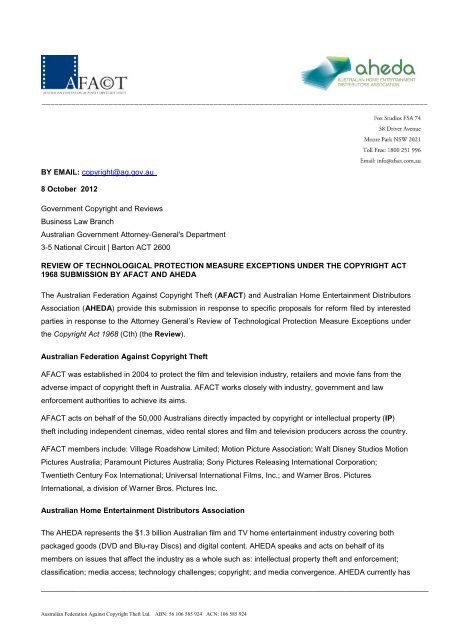

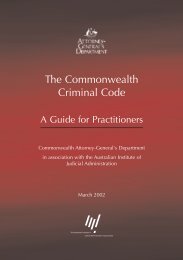
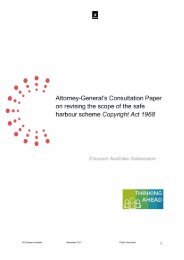


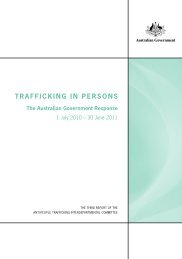
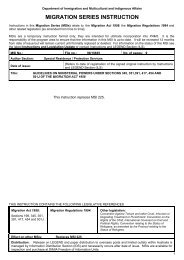
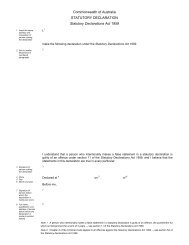

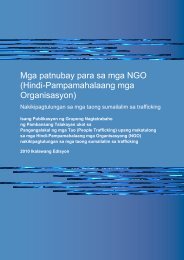
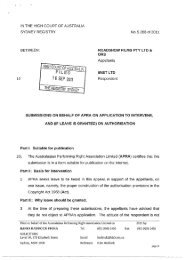
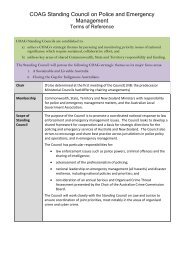

![Normann Witzleb [PDF 657KB] - Attorney-General's Department](https://img.yumpu.com/26247895/1/184x260/normann-witzleb-pdf-657kb-attorney-generals-department.jpg?quality=85)